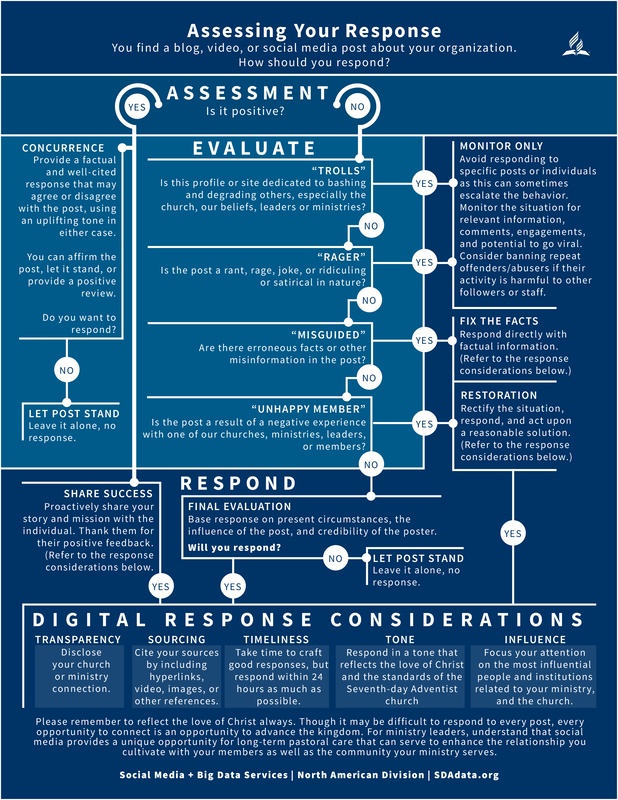Jamie Jean Schneider Domm Digital Strategist, Social Media + Big Data, North American Division Let the members of your online community know through action that you’re fully invested in their lives. This is a Biblical concept found in Romans 12 that can be translated to the modern world. As digital disciples, we can live out Romans 12:15 online. Practically, this means when someone online expresses sadness, anxiety about a life challenge, or excitement about a happy event, we can empathize with them. Engage with their post or send a personal message to let them know you’re with them along the way, that you’re there if they need help. Be consistent and purposeful in your relationship-building. As efforts to censor Christian viewpoints online and in the public space intensify, we may be tempted to respond defensively in a way that doesn’t represent the character of Christ. However, Jesus calls us to be a practical witness, one that puts Him on display in all aspects of our lives, one that is not easily censored. Jesus sought first to fulfill people’s needs; He then invited them to follow. We can use our digital and social influence to gain insights and focus on meeting the mental, physical, and spiritual needs of those around us. Remember, what starts in the digital space can transfer into the real world. Once relationships and trust are built, we can extend our invitation to “taste and see that the Lord is good” (Psalm 34:8, NIV). The gospel of action can further our ministry of hope and wholeness, even when words of truth are silenced or unwelcome. Our integrity, genuine care for others, honor, and faith in Christ can never be taken from us. Our prayers cannot be blocked from reaching God. Christ’s character can never be shut down or banned. By embracing the attitude of a servant first and apologist second, light will shine through us to draw others to the God we represent. Be consistent in building relationships with others who may have very different beliefs. Once they know how much you care, they are more likely to come and reason with you over truth. Understanding that acceptance does not mean approval, what if we became known as people who listened and helped first—without conditions—and people who proactively seek ways to improve the lives of others in practical, meaningful ways, regardless of who they are and without judgement. What if the Church became a safe place to land regardless of one’s affiliation or interest in faith? People share a surprising amount of information online. It’s up to us to act on that information. Modern technology gives us the opportunity to reach into gated communities and closed-off hearts, allowing us to build bridges on common ground. Every post represents a real person, both their experiences and their needs. What prayers can we answer by simply paying attention? The Lord is coming soon because God has made it possible for the gospel to reach the entire world. Digital disciples can change hearts and minds by living out Jesus both online and offline. Empower People: Small Actions, Big Impact Most ministries or churches don't need big data; we need the power of the people. Instead of relying on heroes who single-handedly change the world, we need groups of people working together to make the world around us, in our local community, better. To generate real impact, we need to start small, realizing that big changes in a small community can have a ripple effect in the wider world. Jesus spent time with the community to understand and meet people's needs. This is where digital disciples can play an important role. Train all the generations in your church to:
Develop a Relationship-first, Empathy-first Engagement Strategy This means redefining our notion of success to include metrics outside of attendance and baptisms. Examples of questions you can ask to gauge success:
Invest the time to build a team. Build a committee of digital disciples who are available to respond to all online comments and messages to your ministry promptly and in a meaningful way, while being human. This also means responding to messages in your inbox. Be the voice that answers back quickly when someone reaches out for help. If someone sends your ministry an email or messages your ministry with a prayer request, a challenging question, or a personal crisis, they should not have to wait more than one business day for a response. Even if you can't answer their question right away, it's vital to let them know that you received their message, are praying for them, and will have a response or resources for them shortly. Christ-like care and an empathy-first engagement checklist:
Create Opportunities for Prayer in the Digital Space I saw that every prayer which is sent up in faith from an honest heart will be heard of God and answered, and the one that sent up the petition will have the blessing when he needs it most, and it will often exceed his expectations. Not a prayer of a true saint is lost if sent up in faith from an honest heart. – Testimonies for the Church, volume 1, p. 121 Even among the skeptical, there is a longing for someone to care enough to pray for us personally. Social media is a powerful tool for soliciting prayer requests and following up on those requests. Prayer can be just one “like,” comment, or message away. Online communication lowers the barrier to asking, making it easy for people to reach out when they can’t bring themselves to do it face to face. I can personally attest to how sending recorded prayers can be a powerful way to minister to others. In the wake of a recent tragedy, I found myself asking, “What if we went beyond ‘thoughts and prayers’”? It happens all the time: a friend posts online that they lost a loved one or something else bad happened. We press the “like” button and carefully scroll over to the sad emoji. Then we type below “thoughts and prayers” or something similar. We’re sincere about it, too. The person is in our thoughts, and we are praying for them. But we can take it one step further. What if they could hear us pray for them? It impacts people so much more when they hear someone petitioning God on their behalf. In times of crisis, they may not be able to answer the phone, or they may not want to talk to anyone. They can still hear us pray if we send audio recordings of our prayers. This can be done on most smart phones and messaging apps. It’s personal and intimate. That extra step that we take to invest in another can have a much more meaningful impact than the standard social media response. Some additional ideas to use digital tools for prayer include:
Additional guidance for assessing your online engagement for ministries:
6/7/2022 05:13:10 pm
I found it interesting when you said that you can have a follow up to ensure that you two are on the same path. My workmate told me yesterday that she was hoping to find insights and encouragement into the Word of God because she was experiencing difficult times, and she asked if I had any idea what would be the best option to consider. Thanks to this informative article, I'll be sure to tell her that she can consult a preacher as they can help her with her prayers for a week.
Duduzile Ntuli
8/15/2022 12:51:52 am
I am currently studying towards my Bachelors Degree in Theology with a Christian Counselling focus. I am also presenting a course on digitising discipleship from a pastoral care perspective. This blog has been such a blessing. God Bless you Comments are closed.
|
Archives
August 2020
Categories
All
|
- Home
- BLOG
-
RESOURCES
-
RESOURCE MENU
>
- ADVENTIST IDENTITY GUIDELINES
- BIG DATA RESOURCES
- BRANDING, IMAGE & DESIGN RESOURCES
- CHURCH/MINISTRY SPECIFIC RESOURCES
- COPYRIGHT & TRADEMARK BASICS
- COURSES
- EMAIL RESOURCES
- GUIDANCE FOR HIRING SOCIAL MEDIA POSITIONS
- PODCASTS
- REPORTS & CASE STUDIES
- SOCIAL MEDIA RESOURCES
- (SOCIAL) VIDEO RESOURCES >
- TEXTING 4 CHURCHES
- TRACKING & ANALTYICS
- WATCH VIDEOS & TUTORIALS
- WEBSITE TIPS
- SOCIAL MEDIA GUIDELINES
-
RESOURCE MENU
>
- SEO
- Digital Discipleship & Evangelism
- COVID-19 RESOURCES
- eNEWSLETTER




 RSS Feed
RSS Feed